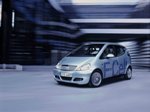|
 Singapore/Stuttgart Singapore/Stuttgart Six Mercedes-Benz A-Class "F-Cell" cars have been on the road in Singapore for a year now. The customers BP, Conrad, Lufthansa, Michelin and the National Environment Agency (NEA) are participating in the world's most extensive trials so far, advancing the market readiness of this drive system of the future.
The test project in Singapore is focused on reliability in long-term use under extreme climatic conditions. Tropical temperatures and high humidity place high demands on the fuel-cells' production of steam emissions, and also on their cooling systems, which have to be far more effective than with combustion engines. The temperature difference between the coolant and the electrolysis in the fuel cell, which takes place at about 80 degrees Celsius, is relatively low. Heat ex-change is therefore more difficult than with conventional engines. The world's biggest trial of fuel-cell vehicles After fuel-cell drive systems emerged from the laboratory stage, in 2003 DaimlerChrysler started the world's biggest trial of fuel-cell vehicles involving cars, vans and buses. Drivers and technicians report on their experience on everyday driving with more than100 fuel-cell vehicles all over the world. The fleets of passenger cars, buses and vans supply valuable information for the further development of this technology of the future. Vehicles and components have to be optimized, while investigating the best way to set up a fuel infrastructure and the general acceptance of hydrogen technology among drivers and passengers. At the beginning of the nineteen-nineties, DaimlerChrysler research and development engineers started working on applying this technology to the automobile. In 1994, the first fuel-cell vehicle was presented, the NECAR 1, which was followed by 20 research vehicles and prototypes. The size and weight of the drive system was significantly reduced while performance was enhanced. 180 patents regis-tered in the field of fuel-cell technology underscore the Group's pio-neering work in this field. Since the end of 2004, 60 Mercedes-Benx A-Class "F-Cell" cars have been in use as a part of this large-scale trial with customers in Germany, the United States, Japan and Singapore. In this initial test phase, some 370,000 kilometers were driven and documented with the vehicles under very varying conditions, about a third of them in Singapore. 30 Mercedes-Benz "Citaro" city buses with fuel-cell drive have been operating on regular routes in ten European cities since 2003. Three more buses are on the road in Perth, Australia, and another three will soon start in Beijing, China. The buses have to prove their reliability in various climatic conditions. During this period, the city buses alone have covered more than 800,000 kilometers and transported over three million passengers. In addition, several vans with fuel-cell drive are operating in daily delivery service with mail-order companies in Germany and the United States. Fuel cells are the key technology for emission-free driving in the future and are also the long-term goal of DaimlerChrysler's "Energy for the Future" roadmap. Over the long term, they offer the best possibility to secure uncompromising environment-friendly individual mobility, because fuel cells run on pure hydrogen or hydrogen carriers and make it possible to produce zero-emission cars: Through the chemical reaction between hydrogen and oxygen to produce water, fuel cells create electrical energy which powers a motor. In addition, the fuel-cell principle is about twice as efficient as a conventional combustion engine |